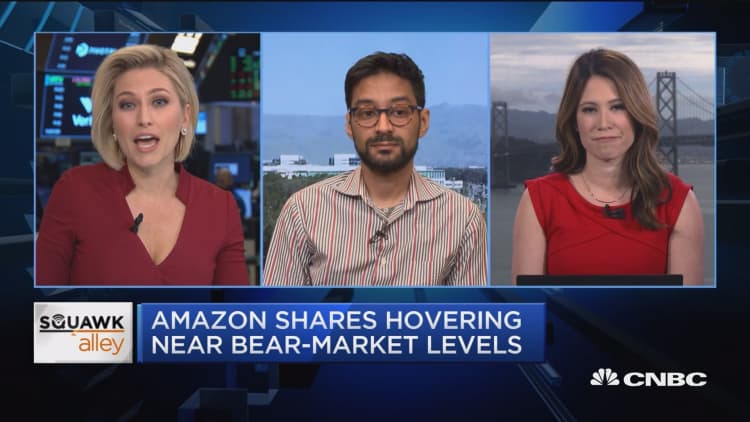If it seems like you're seeing Amazon ads all over the place, there's a reason why: Jeff Bezos no longer hates them.
Amazon's CEO once famously said ads are "the price you pay when your product is unremarkable." But during the company's internal all-hands meeting in November, an employee asked the CEO if he's had a "change of heart" on buying ads for Amazon's own products.
"Yes, I changed my mind," Bezos said with a laugh during the meeting, a recording of which was shared with CNBC.
The company's promotion of everything from its Echo devices to Amazon Web Services led to a 72.5 percent increase in U.S. ad spending last year to $1.8 billion, according to Kantar Media, which tracks TV, digital, outdoor billboards and other platforms, but not social media. That pushed Amazon into the fifth spot among U.S. advertisers and represented by far the biggest increase among the top 10 companies. Amazon didn't even make the top 20 until 2015.
Bezos' about-face on advertising reflects the dramatic change in Amazon's business, which is no longer predominantly an e-commerce marketplace. While most of its revenue still comes from online sales, Amazon now has a whole portfolio of branded products and services that consumers and businesses need to see on TV ads and elsewhere. The four companies ahead of Amazon are Procter & Gamble, AT&T, Berkshire Hathaway (owner of brands including Geico, Kraft Heinz and Fruit of the Loom) and Comcast.
During Sunday's Super Bowl between the New England Patriots and Los Angeles Rams, Amazon will be airing ads for the fourth straight year. Each 30-second spot costs a record $5.25 million this year, and Amazon is expected to run multiple ads during the game.
Those costs are showing up on Amazon's financial results. In its most recent earnings statement this week, Amazon reported a record $13.8 billion marketing expense for 2018, up 37 percent from the prior year. That accounted for 5.9 percent of Amazon's total revenue, the highest ratio in 18 years. Within its marketing budget, "advertising and other promotional costs," which includes referrals commissions, accounted for $8.2 billion, up from $6.3 billion in 2017, it said.
Amazon disclosed in its regulatory filing that the growth in costs was primarily related to increased hiring of marketing and sales people, as well as more spending on "online marketing channels."
'Spend heavily'
Joe Swallen, chief research officer at Kantar, said that while Amazon is becoming more of a product company, it also has to invest more in defending its own turf because Walmart, Target and Best Buy are stepping up promotion of their online commerce businesses.
"Even with its massive customer base and dominant share of online sales, Amazon needs to spend heavily on advertising to counteract the expanding focus of traditional retailers on e-commerce," he said.
Much of that is going to television. According to Kantar, Amazon spent 37 percent, or $679 million, of its U.S. ad budget last year on TV ads, up from 32 percent in 2015.
That's where Amazon can reach a wider audience, even if targeting and measurement is less sophisticated than on digital channels, said Harikesh Nair, a marketing professor at Stanford University.
"TV still provides high reach, making it good for building awareness rapidly," Nair said.
Promoting its brand to mainstream America is important because Amazon has expanded into so many different areas, including hardware, grocery stores and entertainment. Google, Microsoft, Walmart and Hulu are all competitors and require Amazon to broaden its spending, said Carl Mela, a marketing professor at Duke University.
"To build share in these markets requires a substantial marketing investment," Mela said.
Disclosure: Comcast is the parent company of NBCUniversal and CNBC.
WATCH: Amazon Echo is a key part of the company's future, says NYT columnist



